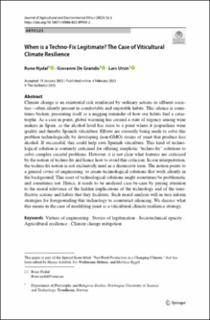| dc.contributor.author | Nydal, Rune | |
| dc.contributor.author | De Grandis, Giovanni | |
| dc.contributor.author | Ursin, Lars Øystein | |
| dc.date.accessioned | 2024-01-18T11:36:20Z | |
| dc.date.available | 2024-01-18T11:36:20Z | |
| dc.date.created | 2023-02-10T12:49:46Z | |
| dc.date.issued | 2023 | |
| dc.identifier.citation | Journal of Agricultural and Environmental Ethics. 2023, 36 (1), . | en_US |
| dc.identifier.issn | 1187-7863 | |
| dc.identifier.uri | https://hdl.handle.net/11250/3112456 | |
| dc.description.abstract | Climate change is an existential risk reinforced by ordinary actions in affluent societies—often silently present in comfortable and enjoyable habits. This silence is sometimes broken, presenting itself as a nagging reminder of how our habits fuel a catastrophe. As a case in point, global warming has created a state of urgency among wine makers in Spain, as the alcohol level has risen to a point where it jeopardises wine quality and thereby Spanish viticulture. Efforts are currently being made to solve this problem technologically by developing (non-GMO) strains of yeast that produce less alcohol. If successful, this could help save Spanish viticulture. This kind of technological solution is routinely criticised for offering simplistic “techno-fix” solutions to solve complex societal problems. However, it is not clear what features are criticised by the notion of techno-fix and hence how to avoid this criticism. In our interpretation, the techno-fix notion is not exclusively used as a dismissive term. The notion points to a general virtue of engineering: to create technological solutions that work silently in the background. This asset of technological solutions might sometimes be problematic and sometimes not. Hence, it needs to be analysed case-by-case by paying attention to the moral relevance of the hidden implications of the technology and of the unreflective actions and habits that they facilitate. Such moral analysis will in turn inform strategies for foregrounding this technology to counteract silencing. We discuss what this means in the case of modifying yeast as a viticultural climate resilience strategy. | en_US |
| dc.language.iso | eng | en_US |
| dc.publisher | Springer Nature | en_US |
| dc.relation.uri | https://link.springer.com/article/10.1007/s10806-023-09900-2#Fun | |
| dc.rights | Navngivelse 4.0 Internasjonal | * |
| dc.rights.uri | http://creativecommons.org/licenses/by/4.0/deed.no | * |
| dc.title | When is a Techno-Fix Legitimate? The Case of Viticultural Climate Resilience | en_US |
| dc.title.alternative | When is a Techno-Fix Legitimate? The Case of Viticultural Climate Resilience | en_US |
| dc.type | Journal article | en_US |
| dc.type | Peer reviewed | en_US |
| dc.description.version | publishedVersion | en_US |
| dc.source.pagenumber | 17 | en_US |
| dc.source.volume | 36 | en_US |
| dc.source.journal | Journal of Agricultural and Environmental Ethics | en_US |
| dc.source.issue | 1 | en_US |
| dc.identifier.doi | 10.1007/s10806-023-09900-2 | |
| dc.identifier.cristin | 2124928 | |
| dc.relation.project | Norges forskningsråd: 283862 | en_US |
| cristin.ispublished | true | |
| cristin.fulltext | original | |
| cristin.qualitycode | 1 | |

